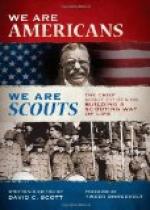The wagon boss said, “Boys, I should not think you would want to go back over this country again.” One of them said, “How would we live?” He answered, “Why, you could go and live with the Indians, and then you could have Buffalo meat to eat and hear the Coyotes howl all the time.”
This remark made a laugh, but I noticed one of the teamsters wiped his eyes on his coat sleeve and got up and left the crowd, and I saw the tears running down his cheeks. After he had gone, one of the other drivers said, “I pity John, for he thinks he will never see his sweetheart again. It was to get money to settle down with that brought him out here, and now he is afraid that he will never get back, and I believe he will go crazy if he don’t get to see his girl in a few months.”
The boss said, “It is too bad, and I will go and see if I can console him.”
When we were ready to strike the trail the next morning, I told the Capt. that I thought we would pass the Comanches’ main village that day. Said I, “If it is late in the afternoon when we pass the Indian camp, it will be best to drive on four or five miles before you stop for the night, and do not pay any attention to me, for very likely I shall be in the middle of the camp, talking with the Chief.”
I struck out, and I had not ridden more than eight miles when in looking off to the south I saw the Indian village. It was about a mile from the trail on the bank of the Arkansas river. I turned my horse and went for the village. When I was about halfway there, I met a number of young bucks, and they all knew me. After I had shaken hands with them, I asked where the old Chief’s wigwam was, and they all went with me and showed me where it was. As soon as I struck the edge of the village, every buck and squaw commenced to shout and shake their hands at me. When I got to the Chief’s wigwam I dismounted, and as he came out to meet me I offered my hand, which is always customary when one visits an Indian, be he Chief or warrior.
After we had talked a few minutes, he told me in his own language that I had come too soon. He supposed I had come to trade with the Indians for Buffalo robes. I told him that I had not come to trade this time but would come all prepared to trade in four months.
Then I told him what I was doing and where I was going, and I told him that if he would tell all his Warriors to let us pass without disturbing or molesting us in any way, I would make him a present of two butcher knives when I came in four months to trade with them.
This promise seemed to please him, for he said I and the pale faces with me could go through his country and none of his Warriors would disturb us. I told him I would want to come back with the same wagons in about one month, and he answered, “It is well,” which meant “It is all right.”
By this time there were hundreds of bucks and squaws and papooses around the Chief’s wigwam. They all thought I had come with knives and rings and beads to trade with them. When the Chief told them that I was only making him a visit, and that I would return in four months to trade, they all wanted to shake hands with me, and while I was shaking their hands, I saw the train pass along the trail, and by the time I had shaken hands with them all it was out of sight.




